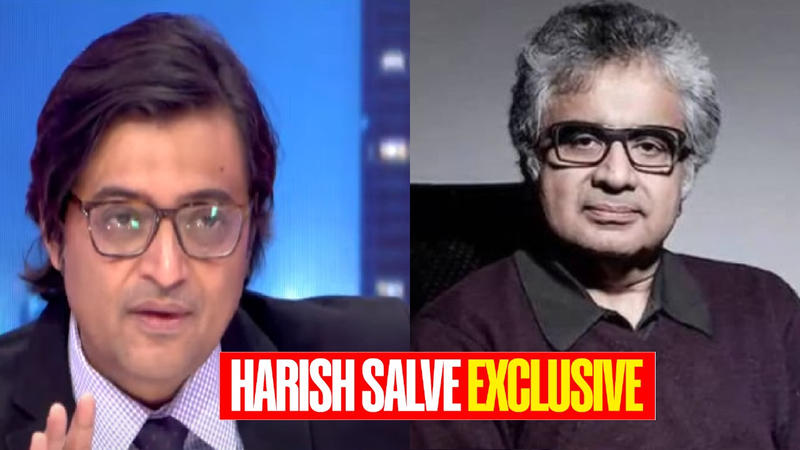Published 23:02 IST, April 26th 2024
Ex-Solicitor General of India Harish Salve Explains Thoroughness of EVM Machines | EXCLUSIVE
Senior Advocate in Supreme Court Harish Salve in an exclusive interaction with Republic TV Editor-in-Chief Arnab Goswami shares his views on EVM and much more.

Senior Advocate in Supreme Court, former Solicitor General of India and King's Counsel Harish Salve in an exclusive interaction with Republic TV Editor-in-Chief Arnab Goswami and Executive Editor Rhythm Bharadwaj shares his views on Electronic Voting Machines (EVM), the thoroughness of the machines, how they are operated, and much more.
Salve debunks myths surrounding 'rigging' of EVMs
Speaking to Goswami after the Supreme Court rejected pleas seeking complete cross-verification of votes cast using EVMs with a Voter Verifiable Paper Audit Trail (VVPAT), Salve asserted that it was not likely that the same political party would have the same button (of vote) all the time. The suggestion that the EVM machine is rigged and any button you press, number four will get pressed may actually end up with all Independent (candidates) getting elected. This challenge had come up in 2019."
Speaking about the intervention of a 'foreign expert,' every time India gets hit with an issue, the top jurist quipped, "Why is it that every time this happens, there is an American expert? In 2019, an American expert said that he could hack the EVM machine. And, Hindenburg (report) happens, there is an American report. When Human Rights abuses happen in India, there is an American angle. Of course, nobody tells you that we feed information to a select person who gives a report and we present it!"
Speaking about the 'hacking' of the EVMs, Salve told Arnab, "In 2019, the Election Commission (EC) declared what they called a 'hackathon.' They said come along and hack it. A friend from Mr Kejriwal's party, some American expert, came and said he wanted to take the machine home. He came with a machine that was hacked. So the short answer was, yes if you change the motherboard, you can change it."
Salve explains how EVMs operate
Throwing a light on how the EVMs worked, Salve said, “It is not connected to the Internet. It has no Bluetooth connectivity. Its connection to the printer with the VVPAT is through a cable. There is no way, in which you can use digital language to talk to this machine.”
Explaining further, he said, "These machines are stored in a warehouse. When the stores are opened and machines are taken out, the representatives of political parties are invited. The machines are first jumbled up and made into separate lots and sent. If it is a Lok Sabha election phase-wise, the machines are sent to the state, constituency-wise where the elections are going to be held."
He said, “Every constituency will have different names of candidates. Therefore, the button for a political party will depend on what the list looks like. That is done in the presence when it is dispatched and then the machines are received and a trial run is conducted.”
He said if the EVM machines work well, then they are deployed for elections. Calling the VVPAT 'the belt and brace' provision, which is brought in to ensure nothing goes wrong. Salve explained that the Election Commission (EC) had also clarified that there has never been a discrepancy between the VVPAT and the machine.
Salve on paper voting
Salve questioned, “I fail to understand on what basis are these doubts (on EVM) getting created. Let's go back to paper voting. Why? Because Germany or England has paper voting. How different are the cultures and ecosystems there? In England, I have never been asked for my identity while voting. They take your word for it, you give your vote and you come away.”
Comparing the contrasting culture of India with that of countries like Europe and the UK, Salved said, “Can you compare it with the rough-and-tumble of the Indian elections? When people give these kinds of examples, wonder and they aren't uneducated people. This is basically putting the country's democracy in a question mark."
Slamming all 'wise and clever people speaking in summits,' Salve said, "All wise and clever people including those whose families had imposed the emergency made such statements in seminars and speeches abroad, it has been going on to pull India down."
Earlier in the day, Supreme Court Justice Justice Dipankar Datta, responding to scepticism surrounding the reliability of EVMs and opting for paper ballots instead, said, "A trend has been fast developing of certain vested interest groups endeavouring to undermine the achievements and accomplishments of the nation, earned through the hard work and dedication of its sincere workforce. There seems to be a concerted effort to discredit, diminish and weaken the progress of the great Nation on every possible frontier."
He said, “Any such effort or rather attempt has been nipped in the bud. No constitutional court far less this court, would allow such an attempt to succeed. I have serious doubts as regards the bonafide of the petitioner association when it seeks a reversion to the old order.”
Justice Datta added, “No Constitutional court, far less this Court, would allow such attempt to succeed as long as it (the court) has a say in the matter. I have serious doubt as regards the bona fides of the petitioning association when it seeks a reversion to the old order.”
In a big move, the Supreme Court rejected pleas seeking complete cross-verification of votes cast using EVMs with a Voter Verifiable Paper Audit Trail (VVPAT) stating that 'blindly distrusting' any aspect of the system can ‘breed unwarranted scepticism.’
Reacting on the same, Prime Minister Narendra Modi, on Friday, asserted the verdict was a 'tight slap' to the Congress-led opposition that must apologise for creating distrust against the EVMs.
Watch the full interview here:
Updated 13:39 IST, June 16th 2024



